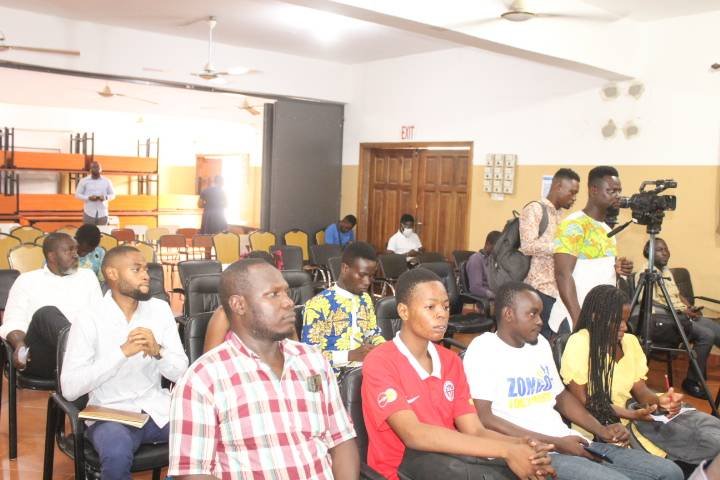
Professor Neil Ferguson, Director of the School of Public Health at Imperial College London, has urged Sub-Saharan African (SSA) countries, including Ghana, to significantly increase investment in the health sector to effectively tackle the growing threat of non-communicable diseases (NCDs).
Speaking to journalists in Accra during a visit to Ghana recently, Prof. Ferguson emphasized that improved cancer diagnostics, cardiovascular care and surveillance systems are critical to reducing the burden of NCDs, which are steadily rising as life expectancy improves and child mortality drops.
“Historically, Sub-Saharan Africa had the highest burden of infectious diseases. But in the last 20 years, we have seen a dramatic decline in this, especially among children,” he said adding “As a result, non-communicable diseases like diabetes, heart disease, and cancer are now on the rise, and governments need to respond with targeted health investments.”
Prof. Ferguson noted that SSA is lagging behind Latin America and Southeast Asia in terms of demographic transitions, such as declining birth rates and aging populations. In Ghana, for instance, he observed a sharp increase in the over-40 population, which corresponds with rising rates of stroke, obesity, and cardiovascular diseases.
“Improvements in nutrition are welcome, but over-nutrition and sedentary lifestyles are contributing to growing obesity and NCD risks,” he added.
Call for Sustainable Health Gains
Prof. Ferguson warned that while Ghana has made commendable gains in reducing child mortality, partly due to international donor support, those gains are at risk without long-term domestic investment.
“You don’t want to lose those gains, as Ghana’s economy grows, so must its investment in healthcare systems. National Health Insurance and improved health services have provided a good base, and I’m optimistic Ghana can sustain this progress.”
Male Fertility Decline and Environmental Concerns
Touching on fertility concerns, Prof. Ferguson referenced studies showing a significant decline in global sperm counts over recent decades. While he clarified that he is not a fertility specialist, he pointed to environmental hormone-like substances, poor nutrition and lifestyle factors as potential contributors.
“Restricting exposure to such hormone-disrupting chemicals in the environment could be a good start,” he noted.
Imperial’s Role in Vaccine Research and AI
Prof. Ferguson, who also leads the Vaccine Impact Modelling Consortium, explained that his visit to Ghana was linked to the Consortium’s efforts to assess the global health impact of vaccines. Supported by the Wellcome Trust, Gates Foundation, and GAVI, the $20 million project is helping governments optimize vaccination strategies.
He reaffirmed Imperial’s commitment to vaccine development, including mRNA and cancer vaccines, and highlighted ongoing partnerships with Ghana to build local research and manufacturing capacity.
Additionally, he announced that Imperial’s Global Ghana Hub, through the Schemic Foundation, is sponsoring Ghanaian students to pursue AI research in public health at Imperial College.
“AI is transforming research productivity. We’re using it not just in infectious diseases, but also in non-communicable disease research,” he said.
Fighting Vaccine Hesitancy
On vaccine hesitancy, which he admitted is rising globally, Prof. Ferguson advocated for a more inclusive, trust-based communication strategy.“People tend to trust their local healthcare providers more than external voices. We need to empower local actors to lead vaccine advocacy,” he suggested.He called for a sustained public engagement campaign to counter misinformation, especially on social media.
Local Response: Ghana Must Mobilize Internal Resources
Also speaking to the media, Dr. Frances Baaba da-Costa Vroom, Senior Lecturer at the University of Ghana’s School of Public Health, said Ghana must re-strategize in the light of declining donor support for healthcare.
She welcomed the recent uncapping of the National Health Insurance Fund, saying it provides an opportunity to reallocate tax revenues to health priorities like vaccination and family planning.
“It may not be popular, but realigning tax policies to directly support healthcare could help us sustain progress. Transparent use of these funds will be essential.”
Dr. da-Costa also called for increased deployment of technology, including telemedicine, and emphasized the need to harness health data for targeted interventions.
“We are generating a lot of data through NHIS and other systems. Let’s build capacity in data science and use this to guide interventions instead of spreading resources too thin,” she said.
The post Investment in Health Sector Key to Combating Non-Communicable Diseases – Imperial Scholar appeared first on The Ghanaian Chronicle.
Read Full Story



















Facebook
Twitter
Pinterest
Instagram
Google+
YouTube
LinkedIn
RSS